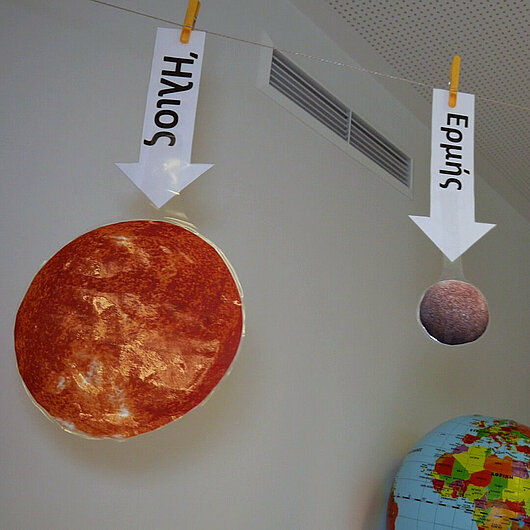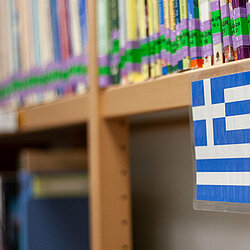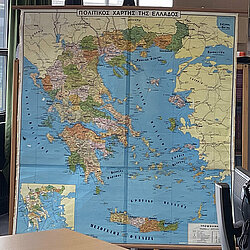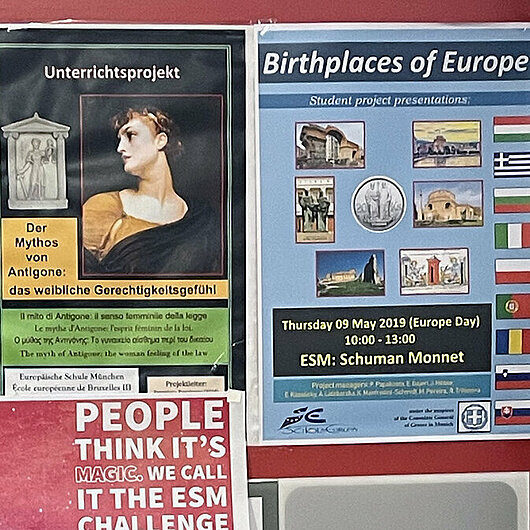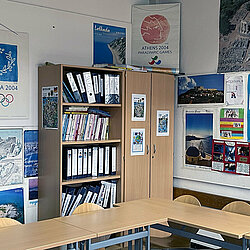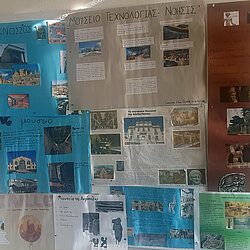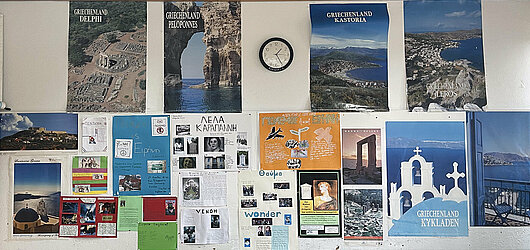When thinking of Greece, almost everyone in Europe immediately has images in their mind. After all, ancient Greece is an important part of every history book. Attic democracy is considered the early model for today's democratic systems, Olympia stands for the world of peaceful sporting competition, and the writings of the ancient philosophers have shaped European thought and science since Socrates. Pupils of all nations and languages at the European School Munich naturally come into contact with Greece and Greek again and again as part of their lessons. However, the lessons for pupils with Greek as their first language are of course particularly intensively concerned with this country, its culture and its language.
Words with Greek roots can be found in almost all European languages. It is hardly possible to imagine today's Western civilisation without this Greek language. Greek is the language of ancient literature and philosophy, of medicine, mathematics and the natural sciences, and as the language of the oldest European translation of the Bible, it is also the language of theology. Greek and Cypriot pupils are organised differently at the European School Munich throughout their school careers. In the Kindergarten and the Secondary School they are part of the SWALS, the Students without a language section, as the international section at the European Schools is officially called. They are enrolled in one of the larger language sections and receive additional lessons in which they learn the Greek language, the history of the country and its culture. In Primary School they are part of the Greek language section. All teaching, apart from the second language, takes place in Greek in the Primary School. From year S2, pupils with Greek as their first language can also take Ancient Greek as an optional subject. From S4 onwards, all others can also choose Ancient Greek as a subject.
In Greece, pupils have been studying Homer's epics for 2500 years. They know the Odyssey and the Iliad, the stories about the Trojan War and the voyage before Odysseus' return to his home in Ithaca. Greek pupils at the European School Munich still learn about these texts, as well as about the diverse ancient Greek mythology. But Greek lessons are by no means dedicated to the ancient world alone. Contemporary literature is also on the curriculum: Greek children's and youth literature, for example by Vangelis Iliopoulos or Rodoula Pappa, in Primary School, and later, in Secondary School increasingly works of Greek literary history by Nobel Prize winners in literature such as Odysseas Elytis and Giorgos Seferis and by important writers such as Konstantinos Kavafis Cavafy or Nikos Kazantzakis and many others.
In his speech for the Nobel Prize for Literature in 1963, Seferis first described Greece quite modestly as "a rocky headland in the Mediterranean", before going on to recall the rich, long and continuous tradition of Greek: "This tradition is characterised by the love of people", said the man of letters. Putting people at the centre is also a central element of the educational philosophy at the European School Munich. Studying the classical works of the ancient Greek philosophers conveys values that are still an essential part of European civilisation and culture today. Universal education is the basis for social participation today as it was then.
And so, the pupils learn about the geography of this "headland in the Mediterranean", from the southern Balkans to the Peloponnese peninsula and the more than 3000 islands. They learn how Greece's long and varied history has influenced Europe, starting with the Greek myth of the abduction of the king's daughter Europa by the god Zeus. You will encounter Greece both in the country itself and here in Munich, for example by studying the city's classicist buildings and the numerous places of Greek-Bavarian solidarity. Whether you derive the ancient polis as the root of the word politics, learn Pythagoras' theorem in maths class, feel connected to a humanist worldview or shout "Eureka!" out loud after solving a tricky homework assignment. No one can avoid Greek influences during their school years and long after.
Profile of Greece
- Capital: Athens
- Population: 10.7 million (2021)
- Bank holidays: 25 March
- Accession to the EU: 1981
- The European motto "United in diversity" is "Ενωμένοι στην πολυμορφία" in Greek.
- Pupils with Greek citizenship in the European Schools system: 1207.33 (2020).
- You should know this Greek phrase: "πάντα ῥεῖ" (Panta rhei) - "Everything flows". Aphorism attributed to the philosopher Heraclitus, meaning that everything is in constantly changing.

